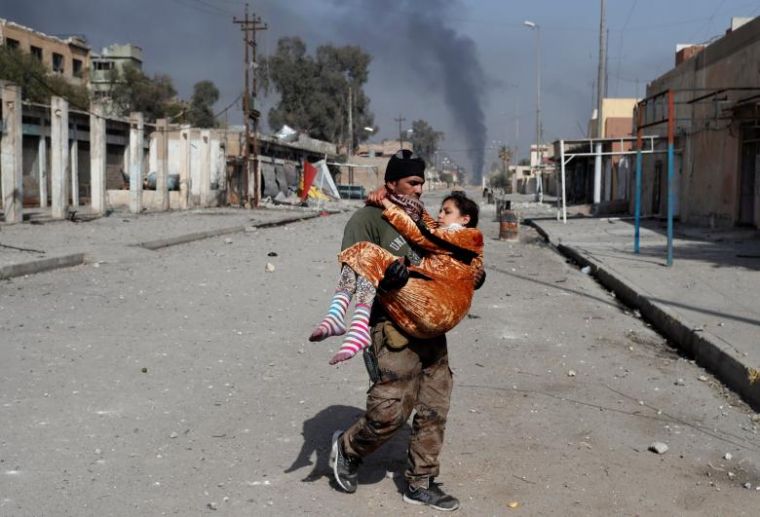Can we ever understand the deep suffering of the children of Mosul?

Maybe we'll never truly understand what some of Mosul's children have been through.
A few days ago, I was able to travel into the city and see some of the destruction for myself. Buildings are reduced to rubble and the streets are deserted. There's so little left – hardly any electricity or running water, let alone schools or hospitals – that it almost feels like starting from scratch.
Many of the images on our TV screens have shown dramatic battles, noisy gunfire and plumes of smoke rising into the sky. But the Mosul I saw this week was eerily quiet – and no place, at least yet, for children to return to.
It's not just buildings that have been destroyed; children's lives have been torn apart too. The families we're supporting in camps outside Mosul have been severely affected by three years of ISIL rule, and months of fighting. So many mothers we meet in the long rows of tents spanning the camps are caring for their children alone, after their husbands were taken and killed or perhaps just missing, they simply don't know.
The families who have reached safety tell some of the most tragic stories of survival I've ever heard. Many children were compelled to witness violence like beheadings in the streets.
We sometimes get a glimpse from children of what they've been through. Our teams of trained social workers are helping many children piece together what has happened. Some children even arrived at the camps unable to speak. I will never forget the small boy who rocked backwards and forwards incessantly, tears rolling down his cheeks, refusing to speak. ISIL had sent him a photo of his dad's body after he was beheaded.
So, while some people see this as the end of a crisis, from our point of view the work is really just beginning.
Aside from the danger of unexploded mines which may be planted across the city, Mosul will need to be rebuilt from the ground up. The end of the offensive will mean improved humanitarian access and, for most families, this relief can't come fast enough. Their situation is beyond critical.
We've already started with a partner organisation to restore schools so that children can get back to their classrooms as soon as possible. It's heartening to see that, amid all the chaos, children still yearn for an education – with their parents' full support. I meet boys who tell me they've been out of school for two years, and some who attended ISIL schools where only violence and extremism was taught. Girls weren't allowed to go to school, and for the most part weren't even allowed to leave their homes.
Put simply, children weren't allowed to be children.
Life in the displacement camps is tough, with searing summer temperatures reaching 50 Celsius and bringing discomfort. Water is rationed, so people often struggle to cool down in their tents lined up across the open ground.
But it's heartening to see, in these camps, how our Child Friendly Spaces offer a safe, protected place where children can just become children again. They can play, draw, learn – all the things that children are entitled to, but which so many have been deprived of in Mosul.
Back in the city these families have yet to return to, water, electricity, essential services have all largely been destroyed. I drove past Mosul's largest power station which is now just flattened buildings and twisted metal. But it's more than just the physical infrastructure that needs repairing. Communities are in dire need of healing and reconciliation so that displaced people can return in peace.
And while Mosul may no longer be under ISIL control, other areas of Iraq have not yet been re-taken with thousands living in areas such as Hawija. World Vision continues to support these families with medical care, safe spaces for children and support to their educational system until they too are able to safely return to their homes.
Elsewhere in Iraq, away from the media spotlight on Mosul, our work continues with others who have endured years of persecution. Across the country as a whole, more than three million people have been forced from their homes. In fact, last year we supported more than 1.7million people in Iraq – half of them children – to access health, water and hygiene, as well as providing dignity, learning opportunities and food security. The work goes on.
In the meantime, at least, there's a sense of hope for Mosul – that laughter, colour and creativity might once again return to the streets. But, as our dedicated staff in the camps know all too well, children have been through a huge ordeal. The healing will take time. And, as ever, World Vision will be supporting families in any way we can on the long road ahead.
Ian Dawes is Response Manager for World Vision Iraq. You can find out more about World Vision's work in Iraq and donate at www.worldvision.org.uk/syria. On Twitter @WorldVisionUK











